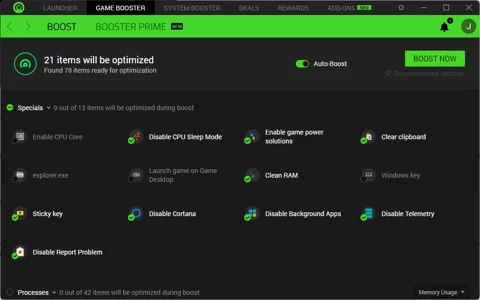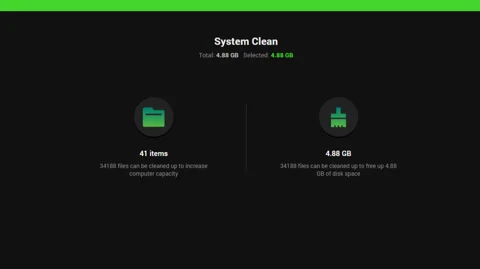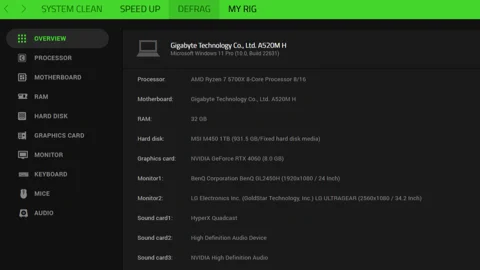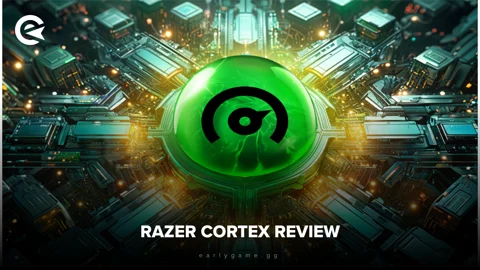If you were thinking Razer Cortex was only for owners of Razer hardware, you're mistaken. This program has a lot to offer all PC-users. Here was my experience with Razer Cortex.

Razer are offering free software that claims to improve your performance. As a gamer (who is painfully aware of how much upgrading hardware can cost), I'm always on the lookout for tools like this, so decided to give it a try.
The short story? It's hard not to recommend Razer Cortex to most users, especially as it's free, but for those with high-end setups the improvements won't feel as dramatic. Check out the full testing below.
All testing was done on Windows 11 using a PC with the following specs:
| CPU | AMD Ryzen 7 5700X |
| GPU | NVIDIA GeForce RTX 4060 |
| RAM | 32 GB |
What Is Razer Cortex?
Razer Cortex is a game launcher that also includes a number of tools for optimization, and a store to buy new games. Like many, I thought the program would only be relevant to me if I owned Razer hardware, but that's not the case.
Included in the suite of tools that come packaged in Cortex are their Game Booster and System Booster, which could be useful to basically anyone who owns a PC. And if you are a gamer, having just one launcher for all your games can save you a lot of hassle.
How Easy Is It To Install Razer Cortex?
Well, as mentioned above, it's completely free, and was very simple to install. Just follow these steps:
- Download the installer (about 7.5 MB).
- Open the installer and select Razer Cortex to download and install (about 250 MB).
- Open Razer Cortex and either sign in via Google, Facebook or Twitch, or just continue as a guest.

Using Razer Cortex
Razer Cortex includes a launcher for all your games, a deal and rewards section, and even a new add-on feature for downloading additional tools from their partners, but in this review I will focus on the two main tools: Game Booster and System Booster. I had decent success with the Game Booster, but it was the System Booster that really impressed me.
Game Booster
A major appeal of Razer Cortex is the Game Booster, which claims to improve performance by optimizing your PC. But does it? In a nutshell: The Game Booster was able to raise my average FPS by about 10-15 frames, depending on the game. Not outstanding, or as much of a jump up as using something like DLSS, but still an undeniable improvement.

It works by going into "Boost Mode" before you launch a game, which it will automatically end once you quit the game. In Boost Mode, all non-essential background processes are disabled. It's very simple, and you could go through and shut down dozens of these things yourself, but with the Game Booster you can shut them all down at once, and then have them all re-open when you stop gaming.
This is not revolutionary technology, but it works and it's convenient.
System Booster
The System Booster part of Razer Cortex can be useful to almost anyone, even non-gamers, and it's some of the best free software of its kind that I've seen. It's effectively four tools in one, and they're all designed for long-term PC maintenance:
- System Clean: This is the most important tool. It finds junk files that accumulate over time and no longer serve a purpose, and then it deletes them. It found 4.8 GBs of said junk files on my computer and then deleted them, all within about two minutes.

- Speed Up: This tool can help users with low-end setups fully optimize their PC for demanding programs. It permanently disables as many unnecessary processes as possible. While stopping just one of these background processes will have almost no effect, combined it could save you a not insignificant amount of memory. However for most users, things which Speed Up wants to disable, like suggested content in Windows Settings, are not worth sacrificing for such small gains.
- Defrag: As it says on the box, the Defrag tool does exactly that, it defrags your HDD. This is useful for those still running games on an HDD rather than an SSD, but as with the Speed Up tool, you shouldn't expect massive improvements.
- My Rig: The final part of the System Booster isn't really a tool, My Rig simply provides you with an overview of your hardware specs. There are multiple ways to do this already in Windows, but the presentation is clean, and the specs are well-ordered.

There are many programs that do what System Clean does, but most of them aren't free, and the ones that are don't work this well. Clean-up tools like this aren't absolutely essential, but you might be surprised just how many junk files accumulate from using your PC daily.
The other three tools have more situational use-cases, but if you're fighting for every extra frame or still using HDD, they could be great for you.
Is Razer Cortex Worthwhile?
Razer Cortex bundles together a suite of tools that are generally well-designed, useful, and (most importantly) free. I think it will be worthwhile for a number of you, especially those with setups on the lower-end.
The program won't move mountains, but at the same time, Razer isn't offering snake oil with Cortex. You will notice improvements in gaming if you use all the optimization tools, and for long-term maintenance, the System Booster tools work as described.


































